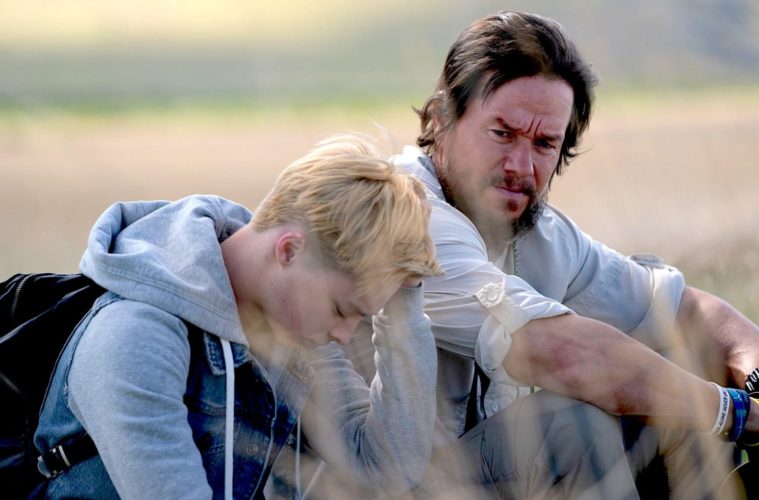 As the fact-based film that bears his name begins, Joe Bell (Mark Wahlberg), a 45-year-old wood mill worker from La Grande, Oregon, is walking down an Idaho highway. It’s May 2013. Joe is wearing a hiker’s backpack and pushing a three-wheeled cart filled with water, food and postcards announcing his “Walk for Change” – a planned two-year trek from Oregon to New York City undertaken in honor of Joe’s son, Jadin, age 15.
As the fact-based film that bears his name begins, Joe Bell (Mark Wahlberg), a 45-year-old wood mill worker from La Grande, Oregon, is walking down an Idaho highway. It’s May 2013. Joe is wearing a hiker’s backpack and pushing a three-wheeled cart filled with water, food and postcards announcing his “Walk for Change” – a planned two-year trek from Oregon to New York City undertaken in honor of Joe’s son, Jadin, age 15.
Jadin (Reid Miller) soon runs across the road to chastise his father for walking too close to traffic. That night the two make jokes as Joe struggles to put up a tent, but seasoned moviegoers will realize soon enough that it’s Jadin’s ghost keeping his father company and that tragedy has prompted Joe’s journey.
At a local high school the next day, Joe gives a short speech on the dangers of bullying (less a speech, really, and more a desperate plea, with no mention of Jadin). Later, at a Salt Lake City drag bar, he devastates a Dolly Parton impersonator (Jason Cozmo) by revealing that his son Jadin, who was gay, is dead.
In a film that constantly shifts between Joe’s present and Jadin’s past, it will take director Reinaldo Marcus Green (Monsters and Men) and screenwriters Diana Ossana and Larry McMurtry (Brokeback Mountain) another 40 minutes of screen time to reveal the specifics of Jaden’s tragic death, and even then they choose not to tell the full story of how the real Jadin Bell died. Perhaps Green and his writers were trying for a leaner tale, as filmmakers must, but there is nonetheless a pervasive sense of missing scenes. We never see Joe, for example, telling Jadin’s story in his talks to schools and community groups. For all we know from this film, Joe was as inarticulate in his public speaking at the end of his trip as he was in that first school appearance in Idaho. (In real life, Bell was always eloquent, even at the start.)
As Joe keeps walking, flashbacks show Jadin struggling to survive community derision at his presence on the football cheer squad as well as the school jocks tormenting him unrelentingly in school hallways, the locker room, and on social media. All of this might feel like Tortured Gay Kid Movie 101 if it weren’t for Miller, who doesn’t shorthand the depth of Jadin’s pain or fail to suggest the spark of kindness and charm that made him so beloved. It’s a beautiful performance.
The best scenes in Joe Bell are phone calls from the road between Joe and his wife Lola (Connie Britton), whose marriage may not have been so great before Jadin’s death but is definitely sinking now beneath the weight of Joe’s overpowering grief. Britton doesn’t have a lot of dialogue, but in the tight press of her lips and the tension with which she holds a cigarette as she tries to talk to Joe, she suggests years of failed marital communication.
The entire cast – which includes Gary Sinise in a brief role as the real life sheriff who befriended Joe on a Colorado highway near the end of his journey – is more fortunate in the quality of the screenwriting than Wahlberg, who co-produced this film but somehow failed to ensure a role for himself that wasn’t steeped in redneck cliché. The Joe Bell he portrays doesn’t have time to hear his son come out because he’s anxious to watch the game. His Joe leaves the football stadium when his gay son is being heckled with taunts and bottles. And his Joe flies into a rage when the surviving younger son (Maxwell Jenkins) who’s come to visit him on the road, accidentally pees on the toilet seat.
Still, Wahlberg does lovely work opposite young Miller and is affecting in the film’s plaintive final third. One wonders about the performance he might have given if his conception of the character and that of the filmmakers aligned more with the real Joe Bell, who appeared in several 2013 press reports about Jadin’s death and the walk. That Joe hated his son’s tormentors and was angry at school officials who failed to support him, even when he and his wife begged them to do so. Joe Bell the film is well-acted and surely well-intentioned, but Jadin and his dad deserved better.
Advertising disclosure: We may receive compensation for some of the links in our stories. Thank you for supporting LA Weekly and our advertisers.

